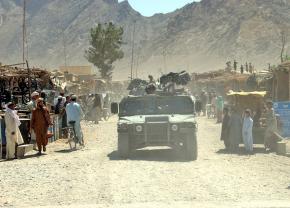Looking past the evidence
describes the moral inversion of the U.S. establishment in attacking WikiLeaks for revealing the casual savagery of the war on Afghanistan.
BY THE pricking of my thumbs, something wiki this way comes...
The phrase may have muttered in the mind of Barack Obama in late July as he awaited Congressional reaction to the release of tens of thousands of classified documents relating to the Afghan war.
The slew of memos, reports and dispatches going back nine years detailed the failure of coalition armies to wrest the battlefield initiative from the Taliban, the futility of efforts to strengthen the Kabul-based apparatus of Hamid Karzai, the continuing counter-productive slaughter of Afghan civilians by coalition forces and the automatic cover-up of all such incidents.
Within a day, however, Obama will have been able to heave a sigh of relief that no real harm had been done and get back to implementing his classy and sophisticated strategy (he's so much cooler than the cowboy Bush) of escalating the war before making a run for it.
WikiLeaks and its presiding genius, Julian Assange, may have hoped their deluge of documents would boost popular revulsion against a war with no clear political objective or moral purpose and put pressure on politicians to call a halt.

But if Obama had fears on that front, they were soon laid to rest. A day after the documents were spread over the front page of the New York Times, the House of Representatives voted 308 to 114 to give him the $33 billion, 30,000-troop reinforcement he had asked for.
The Washington Post reported that the Pentagon top brass had discussed the leaks for 90 seconds before passing on to more practical matters.
And in a piece of spin which would have made Peter Mandelson's toes curl in envy, the White House let it be known Obama had been appraised of all this stuff months earlier, and that it had been precisely on this basis that he had designed his escalate-and-out, surge-and-surrender strategy.
The lesson the WikiLeakers may have to learn is that revealing the atrocious reality of war can have the effect not of sickening supporters of the war, but of stiffening their resolve.
As U.S. commentator Alexander Cockburn wrote at the end of July, the sort of liberals who surround Obama "are particularly eager to proclaim that they 'can take it'--i.e., endure convincing accounts of monstrous tortures, targeted assassinations by U.S. forces, obliteration of wedding parties or of entire villages, and emerge with ringing affirmations of the fundamental overall morality of the imperial enterprise."
WITHIN DAYS, the focus of mainstream commentary had shifted from the staggering scale of the casual savagery that WikiLeaks had unveiled to the morality of Assange and his associates in putting the information into the public arena. One official suggested, quite without irony, that Assange "has blood on his hands."
This moral inversion arises from the grisly, flip-flop character of the U.S.'s 30-year involvement in Afghanistan, beginning in the dying days of the Carter administration when National Security Adviser Zbigniew Brzezinksi won approval for the financing, arming and training of a mixum-gatherum of warlords and obscure Islamist extremist outfits to take on the pro-Soviet government of Hafizullah Amin, and, later, the Soviet troops sent in to prop the Amin government up.
The pointless ineptitude of this long involvement must have occurred to both parties when the chairman of NATO's military committee, Giampaolo di Paola, met last week with the chief of staff of Russian armed forces, Nikolai Makarov. Di Paola was delighted to report afterward that Russia plans to send 27 Mi-17 helicopters to Afghanistan to help "stabilize" the situation.
Makarov told di Paola that Russia now wanted to "pool efforts to find solutions to contemporary challenges and threats to international security." Di Paola in turn allowed that NATO has come to see Russia as "a strong strategic partner, not as a threat nor an enemy."
Russia's ambassador to NATO, Dmitri Rogozin, boasted that "Russian helicopters will ideally fit Afghan conditions. They are easy to operate, reliable, efficient and known by Afghan pilots." Russia could offer the coalition "consultancy in military and combat training based on our Afghan experience, including our mistakes," Rogozin said.
So Russia's old Afghan allies may shortly be co-operating with the U.S., flying Russian helicopters to put down the insurgents they fought against when they were being financed by the U.S.
This is the war that Barack Obama wants to throw tens of billions more dollars and tens of thousands more lives at. For the moment, he may be able to brush aside the gadfly facts from WikiLeaks and get on with it. But it could be, nevertheless, on the principle of the ancients that what goes around comes around--that something wicked his way come.
First published in the Belfast Telegraph.


